One notable survivor from the 1970s is News from Nowhere, the not-for-profit “radical and community” bookshop. MANDY VERE started working there in 1976 – and stayed until her retirement 45 years later. This is her account of the shop’s history.
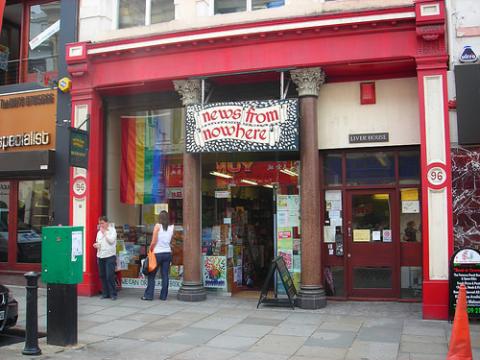
The News from Nowhere bookshop in Bold Street
On Mayday 1974, Bob Dent was struggling to open the door to a small shop premises on Manchester Street, Liverpool. The key wouldn’t work. It was the opening day for News from Nowhere (NfN) and it looked like a disaster. Luckily he soon realised the key was merely upside down, and the life of an iconic radical bookshop began.
Bob had been a student activist at LSE with Maggie Wellings; together they decided to return to Liverpool and for Bob to start a radical bookshop in the mould of London’s Rising Free. It was to be non-sectarian, broadly libertarian and provide books and pamphlets unavailable elsewhere. With a loan from Maggie’s Liverpool Chinese family, the dream was realised, taking the name from William Morris’s utopian novel. Little would they have realised not only how many further trials the bookshop would endure, but how enduring it would become. NfN outlived nine other radical bookshops in Liverpool, more than a hundred radical bookshops nationwide, and survived the decimation of the independent booktrade.
The stock ranged from left critiques of the Soviet Union to anti-imperialist struggles from Latin America to Ireland, from the Little Red Schoolbook to R D Laing and Wilhelm Reich. You would have been hard-pressed to find such works in mainstream bookshops at the time and there was a ready audience among the left in Liverpool.
In those early days 1,000 titles were stocked and takings were around £150 a week, kept in a biscuit tin. Wages were taken out of the tin as necessary.
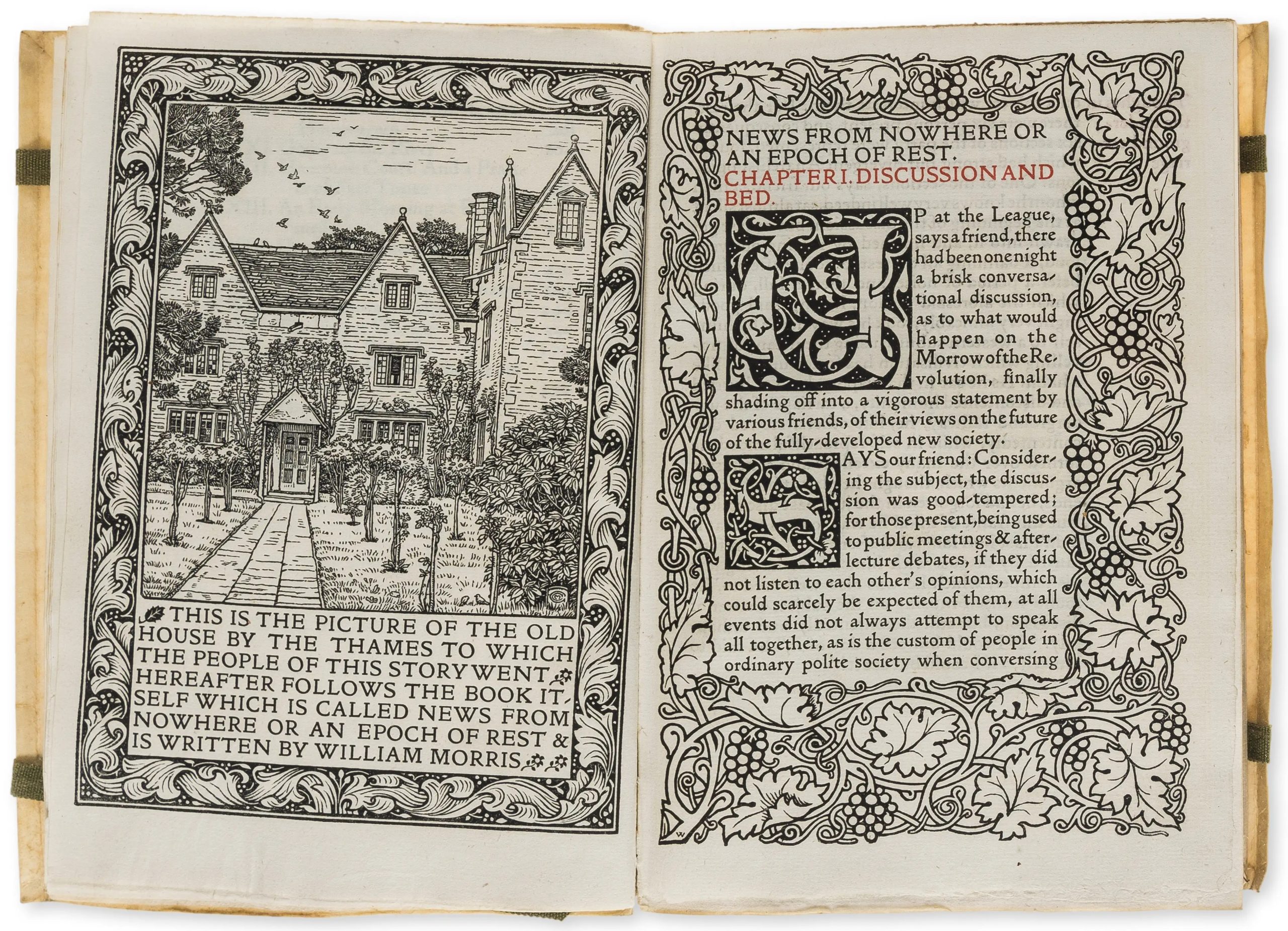
The opening pages of William Morris’s novel
When Mandy Vere joined in 1976, the feminist emphasis increased with Kate Millett, Germaine Greer and Shulamith Firestone appearing on the shelves. Six copies a week of Gay News were stocked. The shop was crammed with subversive literature and the staff had to squeeze onto a bench in the window to work.
The Liverpool Free Press, an investigative, campaigning newspaper started by ex-Liverpool Echo journalists, including Brian Whitaker (who later joined the Guardian), had a tiny office upstairs. It was an influential paper, at one point credited with bringing down the local Council in Kirkby by exposing corruption over building contracts awarded to councillors’ cronies.
In 1977 News from Nowhere moved to a much larger, but extremely dilapidated, building round the corner in Whitechapel. At last there was room to expand. A massive range of cheap, agitprop pamphlets took over the whole back wall; anti-sexist, anti-racist children’s books appeared; a group of old sofas and a kettle for tea-making were introduced, in the tradition of revolutionary coffee houses. Books were imported from America, especially those exciting new feminist authors, and a range of LPs were stocked, by musicians such as Leon Rosselson, and women blues singers.
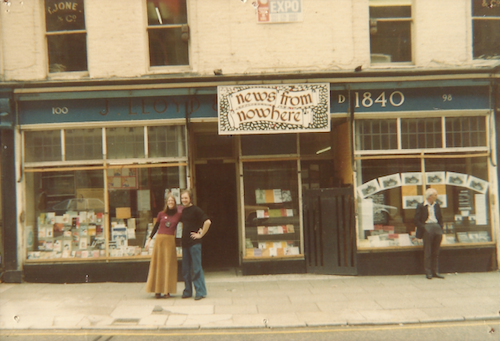
Mandy Vere and Bob Dent outside the News from Nowhere shop in Whitechapel
Exhibitions were held, including paintings of Gramsci, and Don McCullin’s photographs from The Palestinians by Jonathan Dimbleby, and Literary Lunches featuring local historian Alan O’Toole (one of the discoverers of Robert Tressell’s pauper’s grave in Liverpool) as well as members of Unity Theatre and local writers’ workshops. Booklists were produced using the tried and tested Gestetner duplicator. Younger people can hardly imagine the laborious and messy nature of typing stencils, correcting mistakes with pink fluid, and inking the drum to run off leaflets.
The sofas attracted many a character. There was “Peter the Great” who loved the sound of his own voice; an eccentric Stalinist, Dr May, who carried a rolled-up umbrella and harangued anyone careless enough to sit down for a quiet read; and the old anarchist Bob who, during a period of homelessness, would wash his smalls in the back sink and hang them over the gas fire.
Meanwhile the stock expanded along with the radical publishing world. Pluto, Zed and Verso were all now well established. Virago, Women’s Press and smaller feminist presses such as Sheba and Onlywomen were publishing exciting lists and gay publishers such as Gay Men’s Press and Brilliance Books were emerging.
In 1989 the Radical Bookseller produced a list of four hundred radical publishers, and a year later a list of 130 radical bookshops. The range of feminist magazines alone was impressive: Spare Rib, Red Rag, Women’s Report, Shrew, Trouble & Strife, Scarlet Women and, for young women, Shocking Pink. A radical distribution company was established — the Publications Distribution Co-operative. The Federation of Alternative Booksellers, which became the Federation of Radical Booksellers, had sixty-odd members and twice yearly meetings. So there was a ready-made network of outlets for radical publications and News from Nowhere was part of this movement. The bookshop was also an active partner in local campaigns such as the National Abortion Campaign, Troops Out and the anti-nuclear movement. The shop was centrally involved with the alternative political and social club, Liberty Hall, which met every Sunday night, hosting left theatre groups, films, debates and music.
Then, in 1979, Mandy was sentenced to six months in prison for importation of cannabis, due to a parcel being addressed c/o the bookshop. As “Mandy is Innocent” was spray-painted around the city, more workers had to be drafted in to help run the shop and the beginning of the women’s collective was formed as Denise and Madeleine joined. The working practice had always been a collective but it was decided to register as a Workers’ Co-operative and move from the biscuit-tin approach to properly audited accounts. And so News from Nowhere Co-operative was established in 1984.
When Bob left to pursue a career in journalism the collective consciously became women-only. The Women’s Liberation Movement was in full swing and the bookshop wanted to enable women to acquire skills in bookselling and business, and to enjoy the positive aspects of working autonomously in a women-only group. They saw a difference between separatism, whereby women attempted to live separately from men in closed communities and political organisations, and autonomy, whereby women operated within a mixed context but were autonomous from men, supporting each other and making their own decisions.
This was a time when some customers and trade reps would take one look at the woman behind the till and ask to see the boss, or even address their query to a male customer standing nearby rather than believe women could be in charge. The collective received a lot of criticism from socialists at the time, but there is a point of view which contends that the survival of News from Nowhere is due in part to this courageous decision. Certainly the number of women who have worked or volunteered in the shop, benefiting from participation and training, must now be close to a hundred. Feminist campaigns were in the forefront of the Federation of Radical Booksellers too. There was a meeting of Women in Bookselling, and an influential campaign against sexism in publishing when Susie Orbach’s Fat is a Feminist Issue was published with a sexist image on the cover. Stickers were produced to encourage book-buyers to write to publishers to complain about such covers.
Along with feminist publishers, women in radical bookshops were a force to be reckoned with in the booktrade and arguably helped bring an end to some of the more blatant forms of sexism.
As Liverpool entered the 1980s, Margaret Thatcher was in power and the next decade would see the bookshop living through the Thatcher years, with difficulty, but, like the rest of the city, with determination. Just as the Toxteth Uprisings were happening in Liverpool 8, a campaign of arson, violence and intimidation was starting against numerous radical bookshops throughout the country, News from Nowhere becoming one of the worst hit. For a period of six to eight years, attacks came in waves, quite often weekly, if not daily.
Gangs of fascist men, identifying themselves via stickers and leaflets as the National Socialist Party of the UK, would target the bookshop on a Saturday, knocking over shelving units, smashing windows and, on occasion, assaulting members of staff and customers. But by far the worst problem was a series of arson attacks at night. At least six were recorded, some more serious than others, but none managing to completely destroy the shop. There would be damage to the window, where the fascists had prised off the wooden shutters, but the worst damage to the books was usually caused by the fire brigade’s water hoses. The police were of no use, never arriving until too late, and treating bookshop staff as part of a political conflict between left and right.
Only one minor case ever reached court. Besides, the bookshop always had an ambivalent attitude to the police since Mandy’s imprisonment and in the context of police brutality towards the Black community. As always, the best support was from friends and supporters in progressive movements. Liverpool 8 community leaders came down to show support and the other radical bookshops locally and nationally did what they could to publicise the situation. Local supporters, known as the Conspirators, rallied round to help practically, raising the funds to equip the shop with steel shutters. This kept the women staff extremely fit, taking thirteen steel shutters on and off every day! Friends also filled the shop on Saturdays, and even stayed overnight. But at least a couple of workers resigned as the strain of those days became unbearable. There would not have been many job descriptions which required an ability to deal with fascist attacks. The location of the shop was a problem as it was isolated from other shops, next to a derelict site. The collective would spend until 1989 searching for alternative premises on the other side of town.
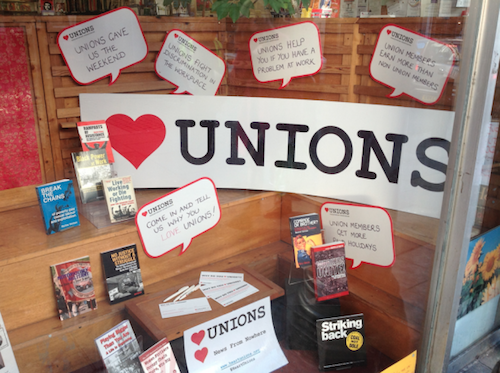
A window display of books about trade unions
Meanwhile, throughout the eighties, there was the Falklands War, the Miners’ Strike, Greenham Common, the Irish war against British occupation and mass unemployment to deal with. News from Nowhere had a role in them all, providing a focus for solidarity movements, selling Coal not Dole mugs and proudly supporting the “Enemy Within” by collecting for striking miners. They involved themselves in the revival of CND and Women Opposed to the Nuclear Threat (WONT) and generally provided a haven for the disaffected, the disenchanted and the dispossessed. During this time, the bookshop refused to accept Barclays cheques in solidarity with the AntiApartheid Movement, and focused particularly on Ireland. They campaigned around the Hunger Strikes, the Prevention of Terrorism Act, strip searches, the British occupation in general, and supported delegations to the North of Ireland. And although Liverpool Free Press had folded, the back rooms of the bookshop were now occupied by a printing firm, Whitechapel Press, and a silkscreen workshop, Sleeping Partners. Badges, posters and postcards were also stocked: “Nuclear Power No Thanks” in every conceivable language, “Just because you’re paranoid it doesn’t mean they’re not out to get you”, “It begins when you sink into his arms and ends with your arms in his sink” — political humour was in evidence everywhere.
The most popular poster at the time was a pastiche of the film poster for Gone With the Wind featuring a young Ronald Reagan carrying Thatcher, with the words “She promised to follow him to the end of the earth. He promised to organise it”, complete with a mushroom cloud in the background.

It must be remembered that dissemination of information in the pre-computer age was primarily through print, and books, leaflets, notices and mailings were crucial in every movement for change. Nowadays the bookshop does a weekly email to over six hundred “Friends from Nowhere”, but back then it sent out Little Bird, a monthly mailing of leaflets, to subscribers, and produced the Merseyside People’s Yellow Pages.
News from Nowhere had a broadly libertarian leaning, bordering on the anarchist, and was fiercely feminist, which meant it had a lot of criticisms of the “straight” labour movement “left”. None more so than Liverpool City Council’s Militant period which, while it was admired for its house-building programme and standing up to Thatcher, was nevertheless narrowly white and male-dominated. Militant alienated the Black community and women equally, at a time when Ken Livingstone’s GLC and other progressive local governments were recognising and attempting to redress manifestations of oppression and privilege in terms of race, gender, sexuality and disability. Liverpool fell way behind on these issues and the bookshop was definitely on the side of the critical voices. However, the non-aligned and non-sectarian nature of the shop meant it could encompass literature and individual activists and campaigns from every strand of the left and progressive thought. All the major socialist and Marxist newspapers were stocked, notices were displayed for every meeting, demo and action, and alternative viewpoints were always given a voice. This could be another reason for NfN’s survival over other narrower-based enterprises.
In the late seventies and early eighties a number of Socialist Bookfairs had been held in London. In 1984 came the First International Feminist Bookfair. NfN responded by holding their own in Liverpool at the Methodist Central Hall in Renshaw Street. It was a gigantic undertaking, involving transporting massive quantities of books to the venue. The daytime Bookfair included authors Barbara Rogers, Maud Sulter and Pat Barker (pre-Regeneration Trilogy and relatively unknown at the time), along with workshops, exhibitions and children’s storytelling. The evening “Write To Be Free” event featured Indian feminist Madhu Kishwar and anti-apartheid activist Ellen Kuzwayo.
With the bookshop’s collective now firmly established as a Workers’ Co-operative, its part in the burgeoning co-operative movement on Merseyside became central. A number of new co-ops had started, the local Co-operative Development Agency was encouraging their growth and in 1984 the Women’s Independent Cinema House (WITCH) made the film You’ll Never Work Alone in which NfN featured. Even within this movement the collective pushed the boundaries by rejecting any form of hierarchical structure and asserting that all workers should receive the same wages, on the principle that you work as hard whether you’ve been there a decade or a day. This remains one of the most revolutionary of the collective’s principles.
Another essential aspect was the bookshop’s welcome to lesbians and gays and its championing of these liberation struggles. Count has been lost of the number of customers who recall their tentative attempts at coming out and how exhilarating it was to be able to walk into a shop which openly displayed lesbian and gay literature. One friend said recently it scared her to even stand next to the shelf, but she could hardly express how important it was for her. At a time when mainstream bookshops had not yet realised the power of the pink pound, when nightclubs were often the only meeting-places, and when Section 28 was looming on the horizon, NfN was a welcome starting point for young lesbians and gays on their journey to coming out.
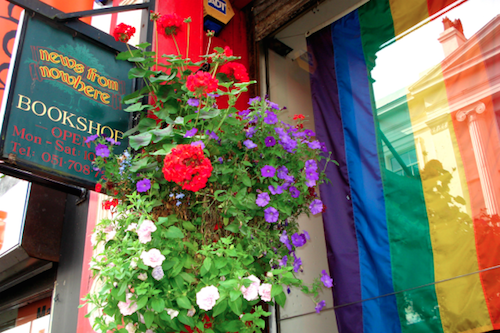
The shop supported lesbian and gay activism
In 1989 premises were finally found for an arts centre housing Open Eye, the photographic gallery, and News from Nowhere, in Bold Street, Liverpool’s most bohemian street. Bold Street was close to the south, more multicultural, end of the city and a perfect home for the bookshop which was by this time being run by Mandy, Sally Evans, Julie Callaghan and Pauline Lavercombe. Mandy was pregnant, so, to cover her maternity leave, Jill Harris joined the collective. The relief of leaving the Whitechapel building, which, as well as fascists, had rats of the furry variety, constant leaks and floods and nowhere near enough custom to sustain the business, was enormous. 112 Bold Street was a bright, newly-furbished shop on a busy street and the collective set about filling the shop with an even better range of books, a custom-built children’s area, enjoying the increased sales and expanding more into author events.
The opening of the new building featured local author Moy McCrory with Brookside stars cutting the ribbon. It felt like they had arrived at last, although the relief of being able to get on with running a bookshop without the constant attention of fascist attacks was somewhat tempered by all the old lefties complaining that the atmosphere just wasn’t the same. Where was their support of workers’ rights — not to work in unhealthy and unsafe workplaces — the NfN staff wondered!
Writers had visited the old shop in Whitechapel, notably Andrea Dworkin and the authors of Lesbian Nuns: Breaking Silence, but in Bold Street the bookshop played host to many more rising and risen stars: Sue Johnston, Jeanette Winterson, Tony Benn, Ronan Bennett, Monica Sjöö, Nell McCafferty and Ken Livingstone. In particular, to celebrate the 20th anniversary in 1994, an event was held every month on different aspects of the shop’s politics: Eamonn McCann for Ireland, Jackie Kay and Buchi Emecheta for Black writers, Mary Daly for feminism, Lois Keith for disability activism and so on. The only disaster was when the lesbian feminist Sheila Jeffreys walked out as questions began. She had apparently had a hostile grilling all day by the media and seemingly couldn’t distinguish between this and a group of feminists wanting to debate her ideas. The meeting continued without her, reflecting NfN’s belief that ideas are ultimately more important than any individual.
Meanwhile, the bookshop, being a part of the feminist and lesbian movements, reflected the controversies of the time over issues like racism and lesbian S&M, and many meetings and teach-ins were held to thrash out the viewpoints. NfN also took the lead in providing space for support groups to meet, including survivors of child sexual abuse, the working-class women’s writing group and the lesbian mothers group. The collective was heavily involved in the Campaign against Section 28. Later there was to be a critique of the divisiveness of identity politics, but during the 1980s and 90s many issues which were later recognised in mainstream society had their beginnings in small groups finding a home and a voice in places such as radical bookshops, in the same way that feminism had its beginnings in small consciousness-raising groups.
Books and politics also converged in the Rushdie Affair. News from Nowhere took the stance of defending Rushdie’s right to publish The Satanic Verses and supporting him against the fatwa and the burning of the book, having no truck with religious institutions of any kind. Original and creative events took place such as the Freedom of Sexuality Kissathon in the window one Valentine’s Day, and the visits of Mother Xmas to read stories to children. Publicity was given to the Liverpool Dockers’ fight, the occupation of the Irish Centre and the Hillsborough Justice Campaign.
At the same time the bookshop was attempting to broaden the diversity of the collective. Judith was the first Black woman to join and she stayed for a number of years, dealing with being the only ethnic minority worker. Not an easy position.
A decision was taken to employ only Black and Minority Ethnic (BME) women, whenever a vacancy came up, until the collective was at least half non-white. This was never achieved and to this day it remains one of the pressing issues. Liverpool’s employment record generally is abysmal as far as BME equality is concerned. News from Nowhere has had limited opportunity to address this imbalance as staff increasingly stay for longer periods. And as the shop workers remain on minimum wage levels this has proven to be a further encumbrance as few BME applicants apply. Although jobs are now advertised to all women, positive discrimination is still applied, all else being equal, and attempts have been made to encourage BME volunteering which can stand people in good stead to apply for future vacancies.
During the 20th birthday celebrations News from Nowhere received a heavy blow. The building fell into the hands of a property company, Frensons, which set about trying to evict the shop. The collective went back into campaigning mode, producing badges saying “Don’t Play Monopoly with Small Businesses”, gathering petitions and raising money for a defence campaign. It transpired that the arts organisation the bookshop had been sub-letting from had defaulted on their rent, and although the shop could prove it had always paid, this wasn’t enough in law to prevent the eviction.
Luckily, the health food shop down the road was closing down so an attempt was made to buy the lease. At that point the owner decided he wanted to sell the whole building for £75,000, then an unimaginable cost. Jill had the vision to see what an opportunity this was to put the bookshop on a solid footing, and the collective set about raising the money, plus the same again for refurbishment. Letters were sent out to all and sundry, including every well-known personality with whom the shop had ever been tenuously connected. The first to respond was Victoria Wood! Thousands were raised in donations and interest-free loans from friends and supporters, appalled at the idea of “their” bookshop going under. In fact, whenever there’s been the need, News from Nowhere has always put the appeal out and help has been forthcoming. Going public has always been and remains the best strategy. This is one of the reasons so many people identify with News from Nowhere and really feel they have a stake in it — because they have!
Amazingly, with the help of a mortgage from the Co-op Bank, loans from ICOF (the co-operative movement’s finance arm) and the Andrew Wainwright Trust, the money was raised and a five-storey building at 96 Bold Street, with a 1,200 square-foot ground floor shop was bought in January 1996. The acquisition was arguably the single most important factor in the shop’s survival. The ribbon-cutter this time was Alexei Sayle, along with his eighty-year old mum, Molly, herself well-known locally as a passionate revolutionary.
Now the shop could rent out the upper storeys to help pay the mortgage. Windows Poetry Project moved in, and soon the Methodist Central Church took over a whole floor and has been a stalwart tenant ever since, running the innovative “Bread Church”, an inclusive, diverse and welcoming space. Despite NfN being avowedly atheist in outlook, this has been a positive and mutual relationship. Various other groups have been housed over the years, currently Nerve, the arts and culture magazine, Liverpool Pride, and a rented flat at the top. In 2007 the Liverpool Social Centre, known as “Next to Nowhere” was established in the basement, a non-hierarchical space for activism, debates, films, meetings, and a vegan café on Saturdays. The whole building became a hive of activity.
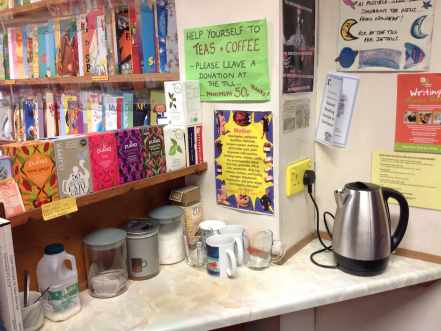
Browsers in the bookshop could make themselves tea and coffee
In the bookshop the children’s area acquired a comfy chair for breastfeeding mothers, together with a toybox, and the kettle reappeared. Instead of Peter the Great, Dr May and Anarchist Bob there were now the various and varied Big Issue sellers popping in for a cuppa. Things had come full circle.
The move to being property owners necessitated a change of emphasis in the collective’s working practices. Up until then they had rotated most jobs, from cleaning to ordering books and doing the accounts. This was becoming increasingly unwieldy and more continuity was needed as the financial responsibilities expanded. Staff began to specialise. They still all did some cleaning, and shifts on the till, but the big jobs of ordering books, keeping the accounts and managing the building began to fall to different individuals, albeit with decision-making still generally taken in collective meetings. At the same time, with the ending of the Net Book Agreement in 1997 (by which bookshops could not undercut publishers’ retail prices) and the consequent pressures on an independent bookshop that could not compete with the chain bookshops on price, more outlets for selling books had to be sought.
News from Nowhere had over the years been supplying books to local schools, specialising in diversity and social issues, supported by the local authority through the Ethnic Minority Achievement Service. Trade came and went with the City Libraries, as they started to set up exclusive contracts with big supply companies. But one of the enduring relationships was with Liverpool John Moores University. For years sympathetic lecturers had recommended NfN to their students, and this expanded greatly at number 96 as there was now room to stock vast quantities of student texts. Other lecturers realised that NfN was far more efficient than the big chains. Every autumn the influx of students brings much-needed trade and a new generation of young people, many of whom take an interest in other aspects of the bookshop’s stock and politics. They are often amazed to discover what a real bookshop looks like as their only idea previously had been the soulless clone-chains.
The Liverpool Community College also took to using the bookshop as stockist for their ESOL student texts, which brought in newly arrived immigrants. One of the sections that attracted them once they had acquired their set books was the increasing collection of World Music CDs the shop was selling. This had grown from a few LPs back at Whitechapel to a massive stand of CDs from all over the globe, plus folk, women artists and political music. To this day it seems unlikely that many other records shops have sections for Armenia, Madagascar, Palestine and Galicia.
In 1999 News from Nowhere celebrated its 25th Birthday, with the theme “Now is the Time”, to publicise and fund-raise for two campaigns, the Jubilee 2000 Campaign to cancel Third World debt, and the attempt to free Mzwakhe Mbuli, imprisoned South African poet, musician and activist. In the usual tradition of combining books and politics, author events were held with feminist historian Sheila Rowbotham, and with Phil Scraton on the tenth anniversary of the Hillsborough disaster. At the social a local band played South African Township music and there was a Bread and Roses themed refreshment table. Other authors to visit No. 96 included James Kelman, Jean ‘Binta’ Breeze, Samir Amin and Armistead Maupin — an eclectic bunch.
Meanwhile it was interesting to note the waxing and waning subjects of the bookshop’s stock in relation to the politics of the times. During the 1990s books by Marx and on subjects like economics were poor sellers. There was an upsurge of interest in alternative health, self-help therapy and New Age books, and NfN inevitably reflected this. However, unlike some radical bookshops which had turned away from politics to embrace mainstream literature, often to their detriment and eventual demise, NfN never took this route.
The assertion of the collective was always that inner and outer change must go hand in hand; both are necessary for the changes we need to see in the world. So while witches and angels crept into the stock, the fiction was always chosen for its depiction of social issues, the children’s books always reflected diverse families and multicultural society — even the humour section was purely feminist or satirical… and there were always those masses of left-wing newspapers. Moreover, even when they were very slow to shift, you could always find a vast array of books reflecting international struggles, political theory, anarchism and revolution. And as the anti-roads protests and renewed interest in ecology and environmental issues increased, so did that section. A bookseller is always having to rearrange the shelves, move things up and down to eyelevel!
Then came 9/11 and as the politics of the world went into spin, Liverpool’s activists once again rejoiced in having a thriving, established radical bookshop to provide them with information, books, notice boards and, above all, an outlet for selling tickets for coaches to demonstrations. As Stop the War’s 15th February 2003 demo approached it became obvious that its size would be unprecedented as bookshop staff were unable to get any work done for weeks beforehand with the level of ticket sales for coaches and trains. Suddenly people wanted to find out about U.S. and British imperialism, the history of Afghanistan and Iraq, militarism and its alternatives, the persecution of immigrants, and exactly whose “terrorism” we should be talking about. The anti-roads protests had morphed into critiques of globalisation and capitalism, and concern about climate change and biopiracy and corporate power. News from Nowhere was yet again an invaluable resource; it was never just a question of selling books but more of helping people engage with a subject.
The relationship with other bookshops in Liverpool had often been competitive. It was hard, having pioneered the stocking of lesbian and gay literature in the city, to see a lot of these customers defecting to the chains, which overcame their squeamishness when they realised that the pink pound was a pound after all. But there was always a new subject to pioneer and, as the other radical bookshops had by now all bitten the dust and one by one the city’s independents closed their doors, NfN found itself in the strange position of being the major independent in the city. There was now a relatively easy equilibrium as NfN’s reputation for efficient and friendly customer service and its Any Book Ordering facility made it a popular destination for general book-lovers as well as diehard politicos. The shop also responded to Liverpool’s intense local pride by championing local history books, which began to draw in more passing trade. In addition, the politics of the shop were no longer seen as quite so scary in a climate of tolerance for sexuality, interest in the environment and championing of diversity issues.
The big change to News from Nowhere’s position in the city came in 2004. Joe Sim, a strong supporter of the shop and Professor of Criminology at John Moores University (LJMU), proposed that NfN should be honoured in its thirtieth birthday year by the University. As a result, LJMU bestowed a Lifetime Achievement Award on the bookshop, complete with an oration in the Cathedral on Graduation Day. In addition, through some sympathetic councillors, an invitation was extended to the bookshop and its guests to hold a Civic Reception in the Town Hall. Did it mean News from Nowhere had sold out? As one Chilean revolutionary remarked on the night, “In the old days, we’d have been storming this place.” It certainly felt like being brought in from the cold after many a year on the fringes of, if not way outside, respectability. However, Mandy’s speech on the night pulled no punches as she reminded the assembled crowd of subversives that the Town Hall and the very streets of the city were built from the blood and toil of Africans during the slave trade, and that racism was the most important issue facing Liverpool today. The theme for that year’s celebration was “We Are All Immigrants”, with badges and balloons stating the same, and an interactive map for customers to pinpoint their family origins, which remains in the shop to prove the point.
The latest challenge is the rise and ruthlessness of Amazon, with its aggressive discounting and its attempts to control and dominate the supply of e-books, while paying no UK tax and being heavily criticised for its employment practices. The bookshop has responded by promoting its own website through which people can access a complete list of books in print, browse NfN’s own recommended booklists and order online, choosing either mail order or collecting from the shop. In other words, ‘Shop with the real Amazons’.
In addition, the collective constantly introduces innovative ideas to enhance the experience of shopping in a real, live bookshop. In-store displays have become more inventive: The Trouble with Religion; No-one is Illegal; the Birds & the Bees (literally about birds and bees); the Big Society Bites Back; and This Land is Our Land: all have featured on the tables. Links with campaigns and community groups have strengthened — many have made use of the shop’s high street window to publicise their causes: Mary Seacole House (a project for Black women’s mental health), Sahir House (the local HIV/Aids centre), Arabic Arts Festival, Hillsborough Justice Campaign and Football v. Homophobia. International Women’s Day, Chinese New Year. Jewish Book Week, Martin Luther King Day: all are celebrated. And many, many bookstalls are provided for local and national conferences and meetings, including the Women’s Aid National Conference, Africa Oye music festival (an outdoor event to which the shop takes a whole marquee full of African CDs) and regional Anarchist Bookfairs, Liverpool Friends of Palestine meetings, local history events and Transition Towns conferences.
Many author events which the bookshop covers are associated with two vital partnerships. One is with Writing on the Wall Festival, now in its twelfth year, which every May brings a wide range of cutting-edge writers, hip hop artists and poets to the city and also hosts a series of Rebel Rants by people like Michael Mansfield, Bonnie Greer and Peter Tatchell. The other is the Bluecoat Arts Centre, which until recently held a series of literature events throughout the year, culminating in the Chapter & Verse literature festival. These have provided invaluable opportunities for bookselling as well as rich cultural liaisons, including enabling NfN to fulfil a cherished ambition to bring Gary Younge to Liverpool. It certainly makes the job of bookseller at News from Nowhere very much more than a nine to five one, and self-exploitation and burnout are always in the collective’s mind.
Then there are special events such as the Ranters’ Corner held on the recent Royal Wedding Day, during which people were invited to step onto a soapbox outside the shop. For two hours the public ranted and raved, sang, recited poetry, got things off their chests and taught each other about issues such as mental health, the attack on benefits for the disabled and the role of the monarchy. It was a brilliant show of people power and just what the bookshop prides itself on — providing a forum for information and debate.
Another exciting development in the last few years has been the Bold Street Festival. Bold Street is primarily a street of independent, often quirky shops and cafés, with some great arts projects nearby. NfN has been centrally involved in developing this annual event to celebrate and bring more trade into the street. There have recently been collaborations with more mainstream organisations such as the Liverpool Biennial, Philosophy in the City and the Liverpool Design Festival. The general trend is to say yes to any joint projects so long as NfN is allowed to retain the integrity of its beliefs and politics. One collective member who campaigns against house demolitions has even gone into the lion’s den by intervening with property developers on the local “regeneration” committee. And, in 2011 NfN was invited onto the steering group of “Liverpool: City of Radicals”, an initiative to commemorate the 1911 Transport Strike.
The collective now comprises Mandy Vere (matriarch), Julie Callaghan (finger on the pulse), Maria Ng (accounts wizard), Cate Simmons (artistic soul), Sara Newton (building supremo), and Sally, Jill and Rhona (wonderful volunteers). Bob Dent said, back at the beginning: “To help us create that better world which William Morris envisaged in News from Nowhere, we need ideas which counter the prevailing ideologies. Access to alternative, creative, radical ideas, which help us challenge the different power structures of society, is not a sufficient condition for changing the world, but it is a necessary one.” Long may News from Nowhere be there to provide that access.
Mandy Vere’s article was previously published as a chapter in “Utopia” (Five Leaves Publications, 2012). This web page was revised on 1 May 2025 to incorporate Mandy’s article. The original version of the page is here.
FURTHER INFORMATION
News from Nowhere: a triumph of patience and hope
Gerry Cordon. Blog post, 2 June 2014
This lovely Liverpool bookshop is run by a women workers’ collective
Alice Lorenzato-Lloyd. Secret Liverpool, 8 March 2023
A life through books: Five decades of radical politics in Liverpool
Profile of Mandy Vere, longest-serving member of the News from Nowhere collective, by Jane Anderson for Liverpolitan website (undated)
Life inside Liverpool’s radical bookshop News From Nowhere on Bold Street
Jamie McLoughlin. Liverpool Echo, 28 October 2017
News From Nowhere: The co-operative bookshop run by women
Maya Osborne. Verso website, 2 March 2016
News from Nowhere
Independent Liverpool (undated)
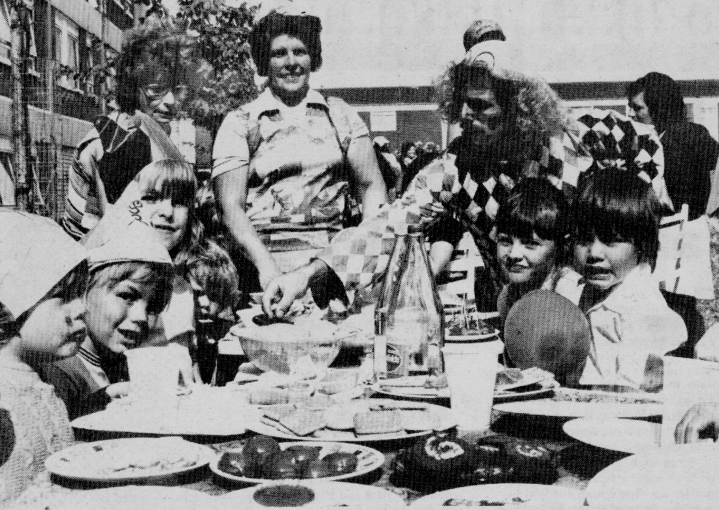
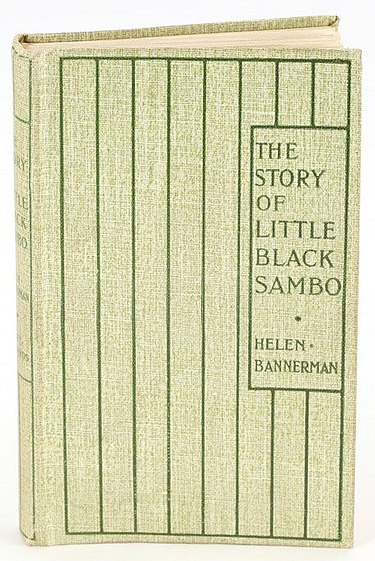
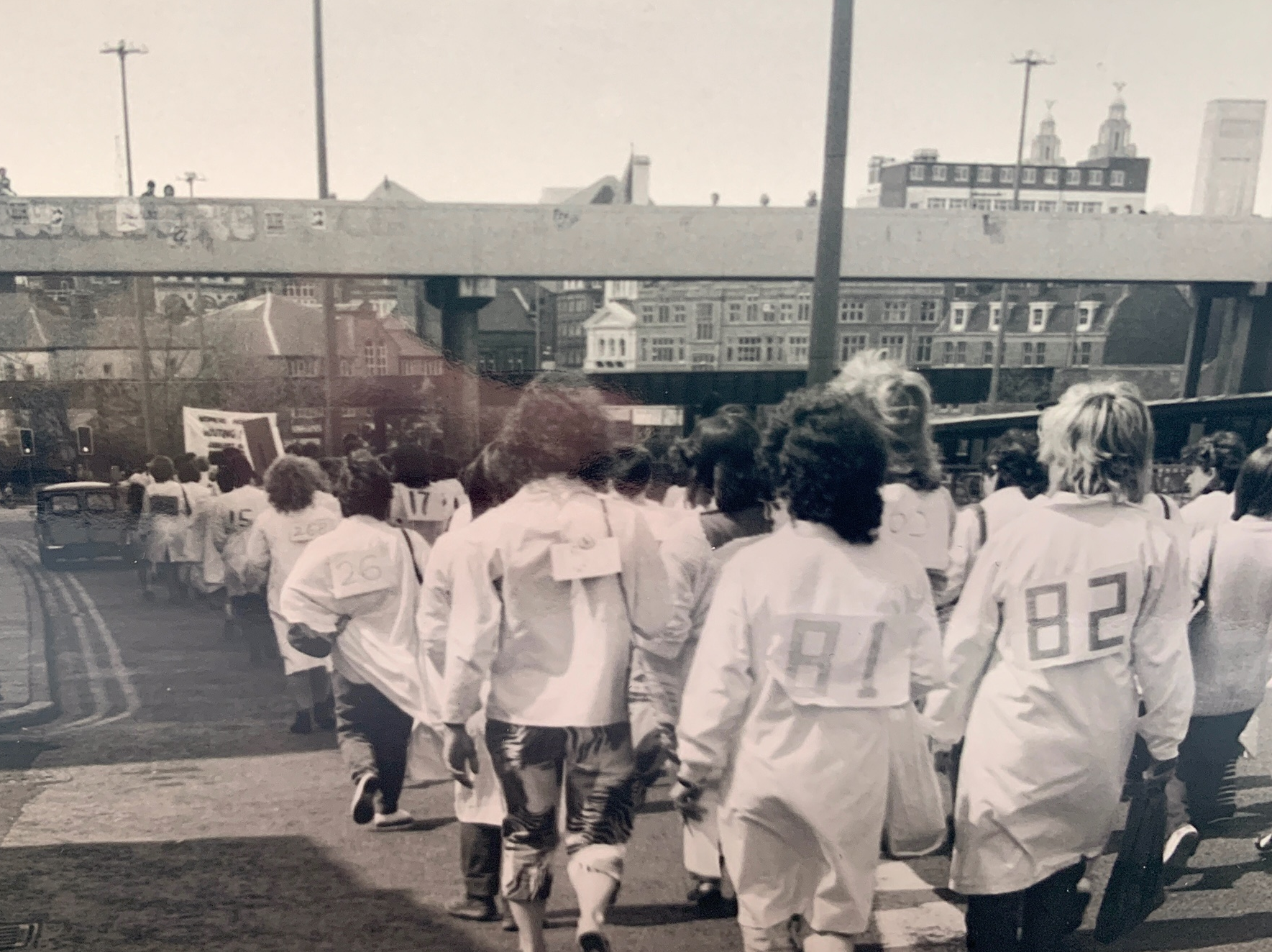

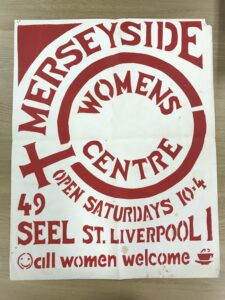
News from Nowhere is part of Merseyside culture- long may it reign!